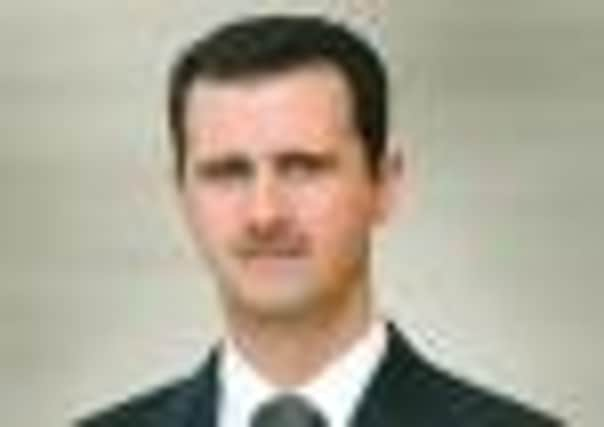Bashar al-Assad warned over chemical weapons


Hague declined to give details of the intelligence, but said president Bashar al-Assad’s regime would face action if the weapons were deployed. American satellites and other devices reportedly detected increased activity at several chemical weapons depots in Syria.
At least one military base is also said to have been ordered to begin combining the components of Sarin nerve gas.
Advertisement
Hide AdAdvertisement
Hide AdAssad’s government denies it plans to use chemical weapons against its own people.
Speaking at a security conference in Bahrain yesterday, Hague was asked whether he had seen proof that Syria was preparing such weapons.
“We and the US, as I said in parliament this week, have seen some evidence of that and that is why we have issued strong warnings about it,” he said. “We have done so directly to the Syrian regime.”
Pressed on what kind of evidence he had seen, he replied: “We absolutely cannot be specific about that because clearly those are intelligence sources that these things come from.
“But we have seen enough evidence to know that they need a warning and they have received that warning.”
Amid speculation that the regime could be targeted with air strikes, Hague said the use of chemical weapons would be a “major change in situation”.
His comments came as rebels continued their assault on Damascus international airport in a bid to cut off supplies to Assad’s forces. Losing control of the airport would be a major blow to the regime, which has recently lost two air bases near the capital.
“The rebels have made major military gains, and have been fighting closer to the regime’s nerve centre, which is the airport, for days, systematically chipping away at the political and military power of the Assad regime,” said Fawaz A Gerges, head of the Middle East Centre at the London School of Economics.
Advertisement
Hide AdAdvertisement
Hide AdThe clashes around Damascus, a city of 1.7 million, have already forced the suspension of commercial flights over the past week, although airport officials insist the facility remains open and is functioning normally.
Rebels said they were targeting the airport in an effort to cut military supplies to government troops.
“This would send a very strong political message to the regime. It will be a moral victory, to say the least,” said one fighter, who gave only his first name, Nour, for security reasons. “The battle to cut off the regime supplies from the airport has started.”
Another rebel, speaking on condition of anonymity for the same reason, said the airport was now considered a “military zone”.
“We urge civilians to stay away,” said the rebel.
Iran and Russia are widely believed to be supplying the Assad regime with weapons through the airport.
Tehran has not given details of its direct military aid to Assad’s regime but has acknowledged that Revolutionary Guard envoys have been advisers in the past.
Moscow has rejected western sanctions against Assad’s regime and said it would honour earlier signed weapons contracts with Syria for the delivery of anti-shipping and air defence missiles. The Kremlin insists the Russian arms sales do not violate any international agreements.
At talks in Belfast on Friday, United States Secretary of State Hillary Clinton said the US and Russia were committed to trying again to get Assad’s regime and the rebel opposition to talk about a political transition, setting aside a year and a half of US-Russian disagreements that have paralysed the international community.
Advertisement
Hide AdAdvertisement
Hide AdClinton stressed, however, that the US would insist once again that Assad’s departure be a key part of that transition, a position not shared by the Russians.
Fresh violence around the capital on Friday came amid the growing international concerns about the use of chemical weapons in the civil war.
Syria has not confirmed it has non-conventional weapons, and insists it would never use such arms against its own people. US officials say intelligence suggests the government does have the weapons and has moved some of its stockpiles in recent days.
United Nations Secretary-General Ban Ki-moon renewed a call for Syria not to use chemical weapons, saying such a move would amount to an “outrageous crime” against humanity.
Speaking after visiting Syrian refugee camps in Jordan and Turkey, he called for an end to the violence.
“The slaughter in Syria must stop,” Ban said. “The military path is a dead end. It only fills the streets with more blood.” Meanwhile, a senior official with the rebel Free Syrian Army said yesterday that commanders from all over the country have elected a new Supreme Military Council and a chief of staff.
The official, who spoke on condition of anonymity as he was not authorised to reveal the meeting’s outcome, said it was similar to last month’s conference in Qatar that unified political groups.
He said the meetings in the Turkish resort of Antalya began on 5 December and are being attended by more than 550 rebel commanders and representatives.
Advertisement
Hide AdAdvertisement
Hide AdThe official said yesterday that Brigadier General Salim Idriss had been named as the group’s chief of staff.
Among the 30 men elected were many with ties to the Muslim Brotherhood and Salafists – both Islamist in character – and excluded the most senior officers who had defected from Assad’s military, it was reported.
“The command has been organised into several fronts. We are now in the process of electing a military leader and a political liaison officer for each region,” said one of the delegates.
The Syrian rebels’ fight to oust Assad has long been hobbled by their inability to forge a united front and command structure.